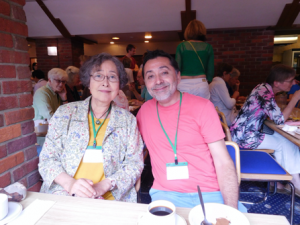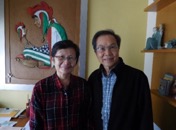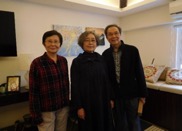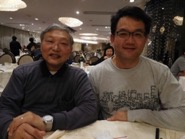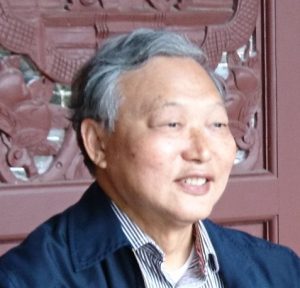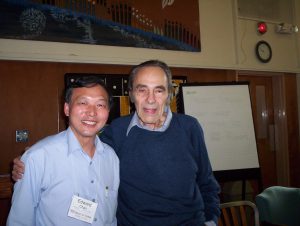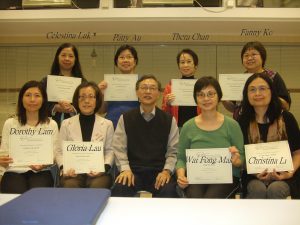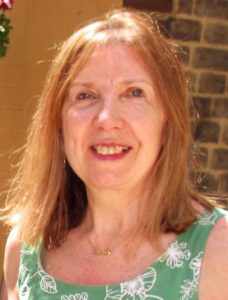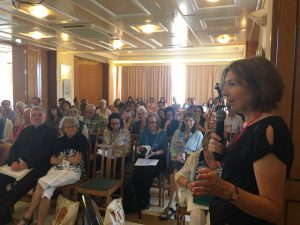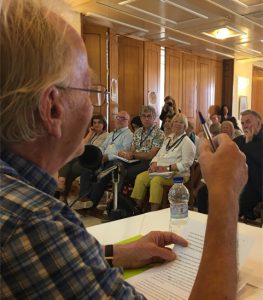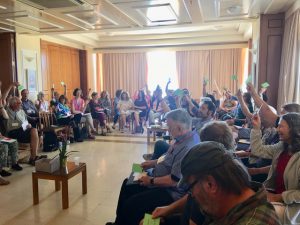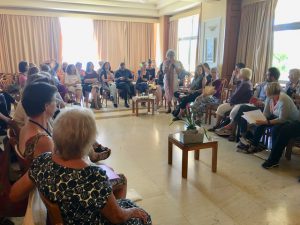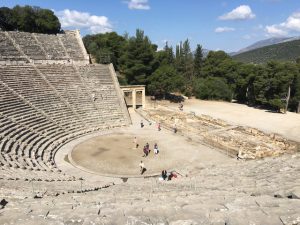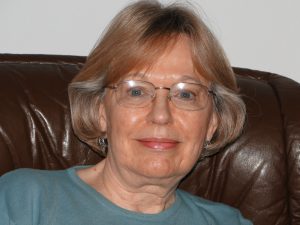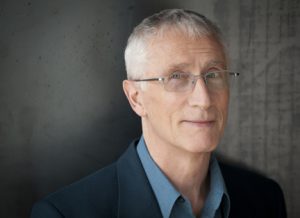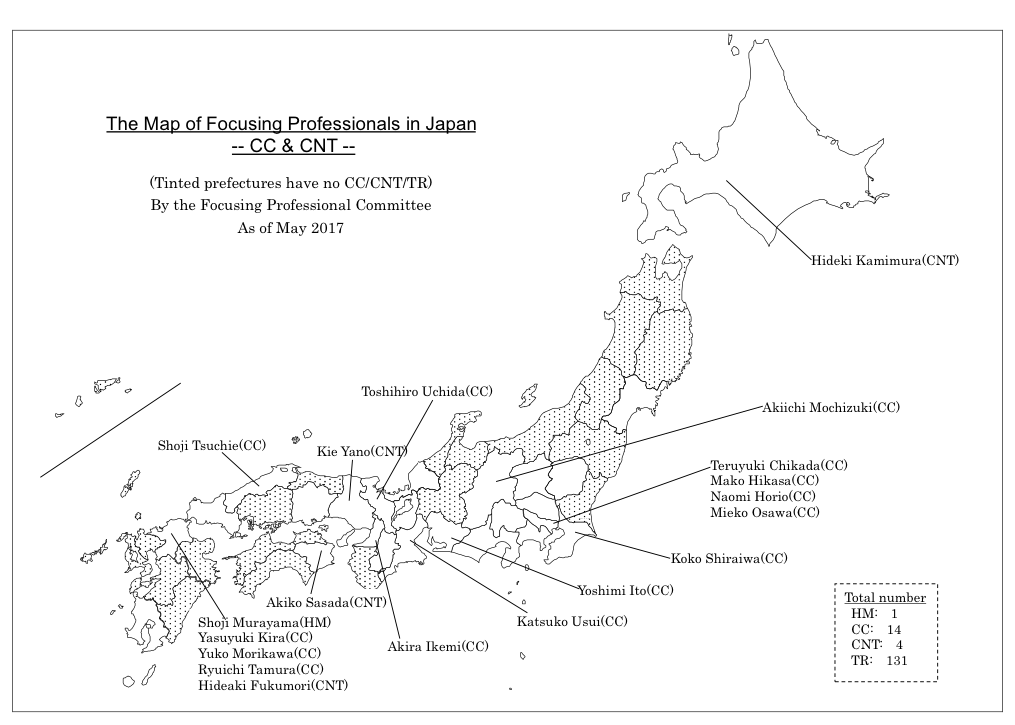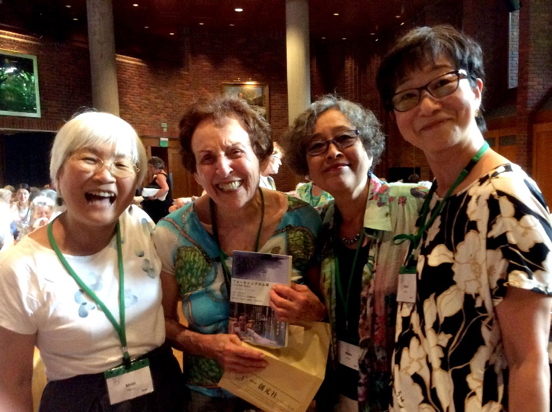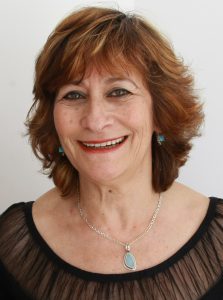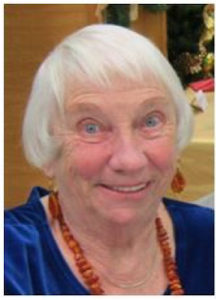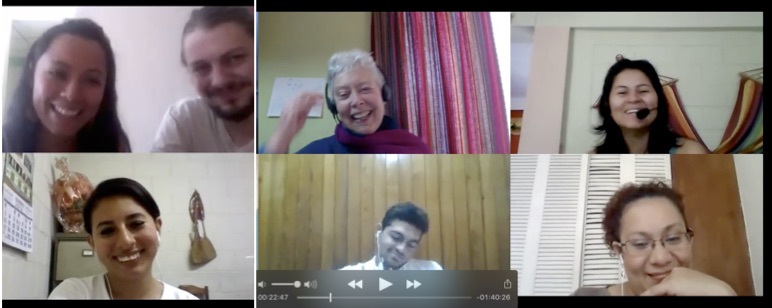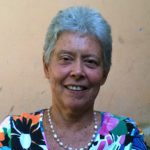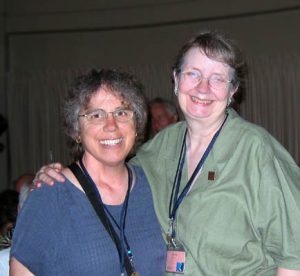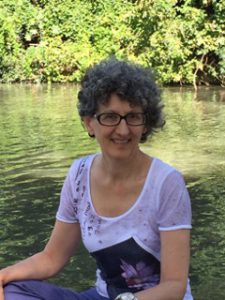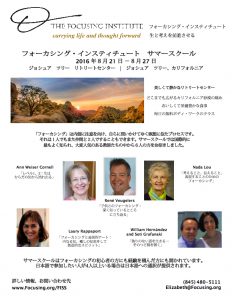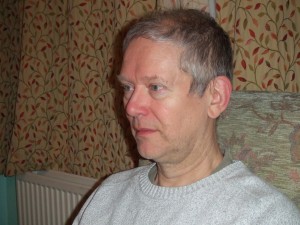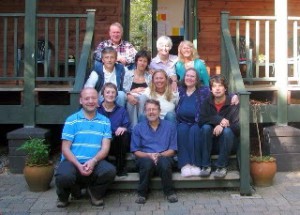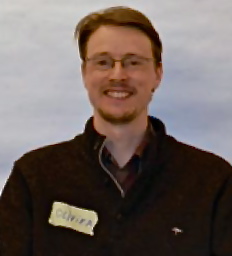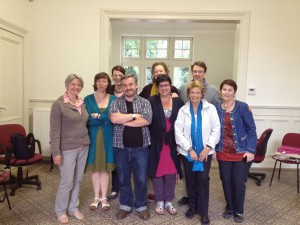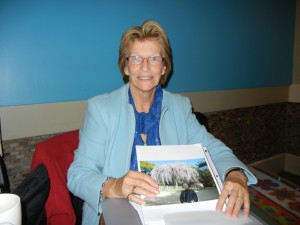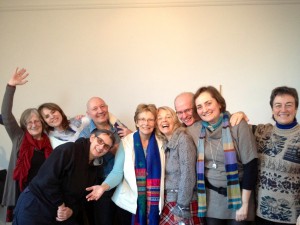The Focuser’s Focus Vol.23, No.2, Summer Issue 2020
フェルトセンスから直接照合体へ
李 明 Li Ming
(上海、中国上海南嘉心理コンサルセンター、国際フォーカシング研究所コーディネーター)
協力:大澤美枝子
(フォーカシング・プロジェクト、国際フォーカシング研究所コーディネーター)
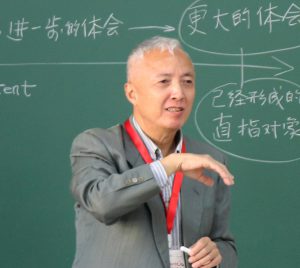
李 明(Li Ming)
本稿は、「小さな直接照合体から大きな直接照合体へ」(中国上海華東師範大学、第二回アジアフォーカシング国際会議、2019年11月9日での発表)を加筆修正したものである。
概要
ジェンドリン(Gendlin, E. T.)は『プロセスモデル』(1997、以下APM、2003年電子版)において、 『フォーカシング』(1981版)の中のフェルトセンス(felt sense)の形成から直接照合体(Direct Referent)の形成へ発展させた。ジェンドリンは、フェルトセンスは直接照合体だと言ったことがあるが、その両者を単純に同一視すると、ジェンドリンのその発展のフォーカシング実践への意義はほとんど理解できなくなるだろう。本文はジェンドリンのフォーカシング————直接照合体の形成————を理解しながら、筆者自身の実践例と交差して直接照合体の形成の促進方法を模索していくものである。
1 不思議な直接照合体
直接照合体は、フォーカシングが最終的に到達したある種の特別、かつ表現しにくい、からだの感覚である。直接照合体が形成された時、私たちは迷宮を鳥瞰するように『プロセスモデル』Ⅷ章の「暗在的に思考する(Thinking With The Implicit」というⅧレベルから、『プロセスモデル』Ⅶ章の、現代人の「文化、象徴、言語」というⅦレベルの問題や困難を見下ろし、問題はまだそのままで何も変わっていないが、それらはもはや問題や困難ではなくなり、ただこれからすべきことだけとなる。そして私たちはそのあとの一連の行動を創造する方向もすでに知っており、からだはすでに準備が整っている。
例1:フォーカサーは、「驚き」、「頭が締めつけられている」というフェルトセンスから、傷つきやすい親密な関係のパターンを探索しはじめた。最後に直接照合体に到達した:「個人、関係、自然はみな調和のとれた全体にあります。人は小さいが心は大きい…仏さまが座っているように…」。セッション直後、彼女は「私は今日、直接照合体を本当に体験しました。それはフェルトセンスとはまったく比べられません。まるで宮殿に入ったようなものです。中は華麗で壮大ですし、また極めて精巧です…いまでもそれを吟味しています…… 」と感想を述べた。
例2:フォーカサーの問題は、ガールフレンドとの関係の危機であった。最初は、扱いにくい「溶液」という言い方で、複雑なフェルトセンスをメタファーにしました。最後、彼は「堅実で妨げるものがなく透明」という直接照合体に到達しました:「これは素晴らしい気分です!わかりました!(笑){笑}ありがとう!ありがとう!大変ラッキー!(笑)わあ!(笑)」 。 1年半後、フォーカサーは「「堅実で妨げるものがなく透明」は私の存在の在り方になりました」と振り返った。
Ⅶのレベルでは、問題の解決は通常、頭で解決策を考える。賢明な人は、「ブレインストーム」(「直接的な文脈の交差」、APM、p258)を思いつくことさえできる。しかし、これらは部分的な考え方に過ぎず、解決策を考え出したとしても、他の部分と衝突することが多く、別の問題の起因になりがちである。Ⅷレベルの「暗在的に思考する」とは、全体的で細部を見落とさない普遍的な思考である。直接照合体は、Ⅶレベルの問題を解決するだけでなく、すべてのⅦレベルの要求とインプライング(implying)を満たし、そしてそれらを超越するのである(APM、p267)!
例3:フォーカサーの最初のフェルトセンスは、「小さな弱い子供が重くて硬い鎧から這い出し、隣に座って息をする」(泣く)であった…最後に、彼女の直接照合体は、17歳か18歳の、柔らかく弾力のある最新のバトルスーツを着てジャンプしている少年スパイダーマン、という隠喩であった。クアリング・ア・スペースで置いてあったいくつかの問題は、もはや問題ではなくなった。そして、そのスパイダーマンはまた「リーグ・オブ・レジェンズ(League of Legendsという映画で、いくつかの映画の英雄が集まっている。つまりこのスパイダーマンは優秀な英雄仲間を持っている)」でもあるのだ!
直接照合体は本当に不思議なものである。
2 Ⅷレベルの二重化
ジェンドリンのⅧレベルの過程の二重化についての論述、すなわちフォーカシング過程と身体感覚全体(whole body-sense、複雑性全体、体験過程全体)の推進過程の二重化の筋道(APM,p238)を理解することは、フォーカシング実践にとってきわめて重要であろう。Ⅷレベル以前、身体感覚全体は、たまに個別なものがあるだけで、変化の連鎖はなかった。フォーカシングで人為的に作り出す新しい環境————身体感覚全体はフォーカシングによって一連の「ビット(bit)」が発生————変化が連鎖になる————そして、からだはそれ自体が推進されていた情報をキャッチし、目が覚めたように、この新しい環境においてインプライングされ、やるべきことを自ら始めようとするのである。
「となりのトトロ」の例で見てみよう。トトロ(身体感覚全体)は常に眠っているが、子供が遊ぼうと誘ってくる(フォーカシング)ことに応答する(フェルトセンス)。二人の遊びが続くうちに、トトロはいきなり興奮して子供をつれて空へ飛び上がった(直接照合体)という、ある自然過程が人為的な新しい環境の中で推進することこそ、Ⅷレベルの過程である(APM,p240)。
伝統仏教では、あらゆる修行はある自然過程を引き起すためだという見方がある。同じく、フォーカシングのインターアクションも、Ⅷレベルの過程を喚起するためであり、直接照合体の形成のために新しい環境を創造するのであろう。したがって、身体感覚全体が自律的に進むことを引き起こす、いかなるやり方も正しいと言えよう。
例4:フォーカサーは最初、ある友人についての夢をフォーカシングしたかったが、クアリング・ア・スペースの後、ただ整理されたスペースにいるままにした。フォーカシングをしなかったが、最後に、直接照合体に到達した。「私は生命力に満ち、命が咲いている木です。内側には泥のような詰まったものや、引っかかるものは何もありません。エネルギーは内と外の間でスムーズに流れています。樹の幹は透明で、すべての潜在的可能性が自由に発芽し、現れてきます。あの夢をもう一度見るなら、まるで一本の透明な木がもう一本の泥が詰まった木を見ているようで、なんでも可能な自由なスペースがあれば、同じく透明な木になると思いますね。」
3 フェルトセンスは直接照合体であろうか?
フェルトセンスは常にフォーカシングに関連するものである。ある状況の全体についての身体感覚(bodily sense)と考えられているが、ある特定されたフェルトセンスは、いつも身体感覚全体の、ある認知可能な側面(recognizable facet)だけとして表現されるのである。
一方、ジェンドリンは直接照合体を「形成途中(「胎生期的」)の直接照合体」と「形成された(「新生期的」)直接照合体」と明確に区別していた(APM,p234)。従って、「フェルトセンスは直接照合体であろうか?」という質問は、「フェルトセンスは形成途中の直接照合体であろうか?」と「フェルトセンスは形成された直接照合体であろうか?」と2つ質問に分けたほうが検討しやすいであろう。
(1)フェルトセンスは形成途中の直接照合体であろうか?
『プロセスモデル』Ⅷ章の「二重化」の観点から見ると、からだは、それ自体の変化によってフォーカシングの人為的なインターアクションに応答するのである。その応答としての身体感覚はフェルトセンスであると同時に、自然プロセスとしての身体感覚全体連鎖上の1ビット、つまり形成途中の直接照合体でもある。それ故、フェルトセンスは、形成途中の直接照合体であるとも、そうではないとも、どちらの答えでも正しいであろう。
ジェンドリンは直接照合体を「形成途中の直接照合体」と「形成された直接照合体」と区別したが、用語上、やはり直接照合体という1つの用語で両者を混ぜて指し示している。彼は、私たちの誤解を招かないよう、2つの異なる用語で同じ連鎖上のものを表現することを避けたいのではないかと思われる(APM,p234)。スイカの苗をカボチャの苗と間違えないというような文脈においては、スイカの苗もスイカだと強調するが、しかし、スイカは甘くておいしいものだといった文脈においては、スイカの苗が甘くておいしいということは理解しにくいだろう。ジェンドリンは、時には、フェルトセンスは直接照合体だと言っているが、彼の言っているその直接照合体は「形成途中の直接照合体」でなければ、すべては筋が通らなくなるだろう。なぜなら、ジェンドリンは直接照合体が形成されないと「モナド化」(筆者注)することはできない」、「IOFI(Instance Of Itself、それ自身の実例)空間は存在しない」と断言したからであり(APM,p253)、私たちは、例えば「冴えない」とか「身動きがとれない」(APM,p229-230の例)などのような、形成途中の直接照合体は形成された直接照合体の持つすべての適用機能をほとんど持っていないことを常識として知っているからである。
末武は面白いことを発見した(末武康弘、2014)。『プロセスモデル』第Ⅷ章p 245までは、つまりフォーカシングを論述する部分には、直接照合体が小文字のdirect referentであり、その後の「モナディング」、IOFI、および「新しい普遍」などを論述する部分には、ほとんど大文字のDirect Referent(DR)であった。末武は、訳した日本語版『プロセスモデル』(2014)の訳者注141で「小文字の‘direct referent’と大文字の‘Direct Referent(DR)’にどのような違いがあるのかは、本文では明記されていないが、おそらくⅧ章のプロセスの中で形成され、ジェル化した‘direct referent’が、大文字の‘Direct Referent(DR)’なのではないかと考えられる。」と推測した。その推測について、今でも異なる見解が存在しているようだが、その発見が筆者の直接照合体への関心を呼ぶきっかけになったのである。
フォーカシングの実践において、「スイカの苗」をカボジャのそれと誤解されないという前提のもとで、ジェンドリンの直接照合体を区別したことを2つの用語で表したほうが、直接照合体を理解しやすくなると思われる。もし「直接照合体」で「甘くておいしいスイカ」————「形成された直接照合体」————を指し示すならば、「スイカの苗」————「形成途中の直接照合体」————を表現するもう1つ用語が必要とされる。その用語が現れる前に、方便のため、筆者はとりあえず既存の「フェルトセンス」で代用したい(上述の二重化の観点からみれば、これは必ずしも全く正確ではないが)。
筆者注:ジェンドリンは、直接照合体から生成されたすべての連鎖を「モナド(Monad、もともとライプニッツ(Leibniz, G. W)の用語)」と呼び、そしてモナド化(MonadingまたはMonad Out)――と、動詞として使用している。モナド化は、直接照合体を“世界全体と交差、世界全体に‘适用’”するという意味である。
(2)フェルトセンスは形成された直接照合体————直接照合体————であろうか?
直接照合体はある側面では文字通りに、人の照合に対する応答でもあるが、ほかのもっと多くの側面では、ある自然過程の推進の最終結果として現れてくるのである。これは明らかにフェルトセンスとは異なっている。
フェルトセンスと直接照合体との比較例表
|
比較例 |
フェルトセンス |
直接照合体 |
|
曖昧さ |
最初は曖昧 |
「直接照合体はいかなる曖昧な感覚でもない..….」(APM,p267) |
|
変化するかどうか |
変化 |
一旦形成されたら、「それはもう変化したり形成されたりはしない。」(APM,p235) |
|
問題を解決する機能 |
問題を陳述する機能のみあり、問題を解決する機能はなし |
「この対象がそれ自体 、その問題をさらに生きることであり、その問題の推進であり、その問題のある種の解決である。」(APM,p235) |
|
モナデング(Monading)適用機能 |
なし |
「直接照合体があらゆることの中へモナド化 する。」 (APM,p246) |
|
IOFIのスペース |
なし |
「この直接照合体の形成がないところには、IOFI空間は存在しない。」(APM,p253) |
|
新しい普遍性 |
なし |
有り(APM,p248) |
|
シンボル化 |
シンボル化によって存立 |
「直接照合体は、ある新たな種類の(シンボルによらない)“シンボル化”である!」(APM,p247) |
|
表現されたのは側面か全体か |
側面 |
全体 |
|
意識レベル |
Ⅶの部分的な「自己意識(self consciousness)」(APM、p133) |
Ⅷの全体的“自我理解(self understanding)”(APM,p244) |
|
他 |
|
|
この比較表から、フェルトセンスは直接照合体ではないと言える。そして、フェルトセンスの形成と直接照合体の形成とは、ある因果関係でもある。一連のフェルトセンスの形成は、直接照合体の形成の環境条件である。従って、1つのフォーカシング・プロセスは、一連のフェルトセンスの形成と1つの直接照合体の形成という、前後2つの段階に分けることができる。
さらに実践上、重要なことは、フェルトセンスの形成方法は直接照合体の形成方法と異なるところがあるのである。前者は主に身体的照合、表現であり、後者は全体の論理的再構成化(reconstruction)である。そのような2つの方法の二重化は、ジェンドリンの基本方法であり、フォーカシングだけではなく、『プロセスモデル』そのものの作成もTAEも、その実例である(ジェンドリン、「TEA序文」)。
以下、『プロセスモデル』および『体験過程と意味の創造』(2016年版、以下ECM)」に基づいて、筆者自身の実践例の逐語記録と交差しながら両者の形成方法をさらに検討していこう。
4 フェルトセンス形成の主な方法————直接指向と表現の循環
Ⅷ章におけるプロセスの二重化の観点では、この段階における私たちの目標は、からだからスタートし、さまざまなインターアクションを通じて十分なフェルトセンスを形成することである。 フェルトセンスは、各側面として身体感覚全体を再構成化する素材であるだけでなく、身体感覚の継続的な変化をも促進する。身体感覚全体が一旦変化の連鎖になると、直接照合体形成のための新しい環境になるのである。
直接指向(Direct Reference,ECM第Ⅲ章A)は身体感覚とのインターアクションの基本的な方法の1つである。フォーカサーの直接指向の意欲や能力はフォーカシングの前提条件でもある。ある状況について最初何もない内面へ直接指向すると、身体感覚として曖昧な何かがゆっくりと現れてくる。そのまま続けると、それが明確になり、言語やその他の象徴で表現することもできるようになる。からだの応答として、これはフェルトセンスといわれる。そして、その指向のスタンス(stance、態度、立場、視点など)が調整されると、フェルトセンスも変わる(APM、p239)、あるいは、新しいフェルトセンスが得られる。
フェルトセンスの主な意味は、それ自体にあるのではなく、ほかのフェルトセンスとの関係の中に、つまり全体にある。全体こそ部分に意味を与えることができるが、部分の理解を積み重ねるしか全体に到達できない(ジェンドリン、「応答の秩序」)。形成されたフェルトセンスを離れて、身体感覚を再び直接指向し、さらに表現(言語化)によって次のフェルトセンスを形成するのである。このような循環をすれば、ひとつながりのフェルトセンスが得られる。それと同時に、身体感覚も推進されるのである。
内面的統合(Internal integration)は、直接照合体が形成される1つの前提的環境条件かもしれない。もし内的にはそれぞれ隔離されていて、引っかかるものが多くて重たければ、身体感覚全体は1つの全体として前へ推進することが難しいだろう。トラウマの治癒は内面的統合の1つであろう。トラウマとは、ある苦痛かつ圧倒的な体験である。それを感じさせないように、立ち入り禁止の「部分(part)」————「凍結構造(Frozen structure)」————が作られる。通常、トラウマ・フォーカシグはほとんどフェルトセンスの形成段階で終わってしまい、直接照合体の形成までは進まないとみられる。トラウマがほぼ治癒され、部分が全体に溶け込んで初めて、身体感覚は1つの全体として直接照合体の形成へ推進することができる。
5 直接照合体の形成の主な方法————関連や交差
直接照合体の形成段階では、私たちは主に一連のフェルトセンスの間の関係を発見し、身体感覚全体の連鎖を再構成(reconstitute)し、そして身体感覚全体をその文脈(Context)全体、状況全体と関連(relevance、ECM,p128)させて、全体の意味を理解するのである(APM,p241)。このような全体的な理解はさらに身体感覚全体の次の一歩————直接照合体の形成————を促進するものである。
フェルトセンスの形成、すなわちからだの直接照合に対する応答はほぼ確実に得られるが、しかし直接照合体の形成には、はるかに多くの環境条件が必要とされるので、必ずしも私たちの手が届くとは限らない。しかし、以下の例のように、私たちはいろいろな促進を試みることができるだろう。
(1)全体のまとめ
1つのフェルトセンスを形成して、回帰するとき、身体感覚全体がすでに推進されている。次に形成されるフェルトセンスは全体連鎖の次のビット上の一側面であり、しかも、全体連鎖上のあるビットの表現でもある。「側面」でも「推進」でもある一連のフェルトセンスは螺旋的な前進のようなものとして、身体感覚全体の連鎖を再構成することができる。
しかし、フォーカサーは絶えずいま、ここで、部分的に照合したり、表現したりしているので、それまでに言ったことを必ずしも全部覚えられない。その時、リスナーの援助が必要になってくる。リスナーのまとめ的な伝え返しは全体を再構成化する上で有効であろう。まとめ的な伝え返しによって、ここまで形成された一連のフェルトセンスおよびその推進のプロセスという全体像をフォーカサーに提示することが、フォーカサーの全体の連鎖を再構成することを促進するのであろう。
例5:……リスナー:親に殴られたとき、髪の毛が半分剃られたとき、恥が強く感じられる。怒りが強く感じられる。そこでは火が転がっているようだけど、親を責めることはできない。誰も憎むことはできない。それは表に出せない。それは何だろう、 私たちはすでに知っている:「畜生!……!」ということですね。
フォーカサー:それでいい、それでいい。昔のことはどうでもよいです。しかし、私がなぜ権威を攻撃するかということも、理解するようになりました……
(2)全体的な関連についての問い掛け
一連のフェルトセンスを、1つの身体感覚全体の連鎖を再構成して理解したとしても、それはまだ身体的感覚だけであった(APM、p241)。その全体の意味を理解するためには、状況全体、文脈(例えば、過去の経験など)全体、ほかの関連全体等々との様々な関連を発見したり創造したりする必要がある。
問い掛け(questioning、ask)は、「暗在的に思考する」方法の1つであり、「体験過程の手順(RCM、p179)」の最初のステップでもある。問い掛けは、禅の「疑念」に似ている。問い掛けをしたまま、その答えを考えなければ、その問いかけの圧力が暗在的なものにかかって、働くようになるだろう。しばらく沈黙した後、時々思いがけない結果が現れる。
例6:…… リスナー:最後にお聞きしたいのですが、この悲しい、つらい、本当に頑張ったという気持ち、これらのすべてが、今、何かを言おうとしているなら、それはあなたに何を伝えようとしているのでしょうか。フォーカサー:{30秒沈黙}もう少し時間をください。 (ああ、ゆっくり、ゆっくり。){58秒沈黙}家族がお互いにサポートしあう場面が浮かんてきました……
(3)リスナーからの交差
リスナーが自分の体験や理解の交差を試みることは、さらにプロセスを推進させる。筆者のリスナーとしての交差はほとんど直接照合体の形成段階で行われる。もし、フォーカサーがその交差に共鳴して、あるひらめきが得られたら、リスナーの体験や理解はフォーカサーと共有するものになる。もし、フォーカサーがそれを却下する、あるいは部分的に却下するなら、それは、フォーカサーがその判別するものを発見、表現することを導くことができる。リスナーが気にしているのは、プロセスが推進されたかどうかであり、自分が正しいかどうかではない。それに、フォーカサーはセッションが終ったあと、リスナーの言い間違いなどあまり覚えていないし、ほとんど気にしないだろう。
例7:…… リスナー:あなたは、時間がないと言っていますが、子供のことはあなたのスケジュールに入れない気がしますね。あなたはほかのもっと重要なことをしなければならないので、時間がないと言っていますね。そうでしょうか。フォーカサー:そうです。仕事のほうは達成感がすぐわかるからです。子供を教育するのは長すぎます。すぐ結果が欲しいのです。子供と長く一緒にいるよりは、自分が好ましいと思う子供の理想の姿が欲しいだけです……
(4)新しいスペースを通しての推進
身体感覚全体、状況全体、文脈全体の間のインターアクションは、新しい意識レベル上で行われているものである。その新しい意識レベルは、Ⅶレベルの再帰的、部分的な「自己意識(self consciousness)」より、もっと高い「自己理解(self understanding)」という全体論的なものである(APM、p261)。それ故、感じられたスペースははるかに広大なものである。スペースはインターアクションの産物でありながら、しかも、広大な新しいスペースもまたそのインターアクションを推進していくことが可能である。プロセスがうまくいかない原因は、スペースが欠けているだけだということがよくみられる。上記の例4のように、新しいスペースがあれば、プロセスは再開(resume)あるいは推進することができる。
例8:……フォーカサー:{30秒沈黙}突然、自分のスペースはとても広いと感じました。(ああ)なんか自分の包容力は大きくて、すべての生き物を包容できます。あるいはすべての生き物の苦しみを見ることができるようです。ちょっと恥ずかしいですが{笑}、弥勒菩薩のような大きさ!ハハ。あなたが聞いてくれていますが、私はあなたをも包容することができるようですよ!リスナー:OK、OK。人と関わりを持ったとき、私たちは自分のニーズを抑え、そして人に気に入られるように、自分の肉が切られ、血が吸いとられるように人に与えていますね。我慢ができなくなると、その関係をカットしようというパターンが繰り返されていることを、私たちは見ました。しかし今、私たちは弥勒菩薩ですね。弥勒菩薩はこのようなパターンをどう見るのでしょうか?フォーカサー:人に気に入られるように、自分の肉が切られ、血が吸いとられるように与えているように見えますが、実際背後には、気に入られたいという非常に大きな心理的なニーズがあるんです(ああ)……
(5)直接照合体で交差
直接照合体が形成されたあと、間もなく感じられなくなる。暗在的に機能し続けているが、忘れやすくて衰退しやすいものではないかと思われる。フォーカサーがセッションの録音に基づいて逐語記録を作成することは、もう一度フォーカシング(そこから新しい感情や理解が生まれる)をすることでもあるし、直接照合体を文字で定式化し、衰退を減少するやり方の1つでもある。私たちは逐語記録を使って直接照合体を再び喚起することが可能である。時には、次の直接照合体を形成するために、前回形成された直接照合体を喚起して交差することもできる。
例9:フォーカサーは、前回のフォーカシングで形成された直接照合体を「巨大な我、母のように寛大、ご先祖さま」という言語表現で何度も何度も喚起し、次のフォーカシングをサポートしていた。
また、筆者の実践から見れば、たとえば1時間前後のセッションで直接照合体の形成に到達することができた場合、通常、前半の大部分の時間は一連のフェルトセンスの形成に費やし、後半の約三分の一の時間は、身体感覚全体の連鎖を再構成化し、からだ・状況・文脈などの全体的な関連を発見、創造、理解することに使うと思われる。そして直接照合体が形成される寸前に、1つあるいは複数の非論理的な、次のステップへの「飛躍」がよくみられる。リスナーがフォーカサーに「あと5分です」と告げると、まるでからだをプッシュするように、直接照合体の形成が最後の数分間で発生することもある。
6 結び:直接照合体ーーーー様々な知恵へのハブ
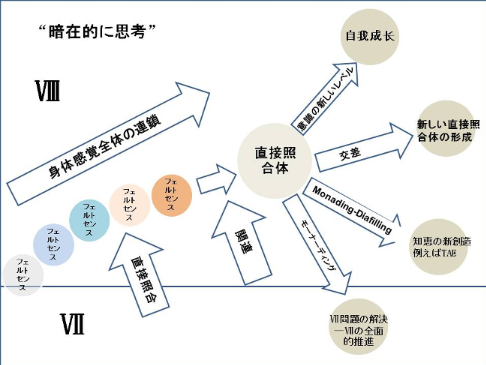
この「暗在的思考」の概略図から、直接照合体がⅧレベルの中でハブ的な位置を占めていることがわかる。もし私たちが以前、ただフェルトセンスの形成のためだけにフォーカシングをし、ある程度のフェルトシフトに満足したのであれば、今、私たちは視野を広げ、直接照合体の形成は、フォーカシングの目的や方向だと心得るようになった。直接照合体に到達する難易度は、課題(問題、困難)の大小や深さ、フォーカサーなどによって異なるが、直接照合体が形成されない限り、何回セッションをしても、そのフォーカシン・プロセスは完了するといえないだろう。そして、直接照合体が一旦形成されると、「それはもう変化したり形成されたりはしない(APM、p235)」。すなわちそのフォーカシン・プロセスは完結するのである。そして、それと同時に、直接照合体の多くの適用プロセスが始まる。
直接照合体が形成されると、第Ⅶ章におけるさまざまな面へ「モナド化(Monad out)」できる。たとえば、TAE(Thinking At the Edge)によって独自の新しい用語や理論を創造することができる。直接照合体があれば、私たちはさまざまな交差(crossing)を通して「新しいもの(Novelty)」を作ることができる。
直接照合体は私たちが「暗在的に思考する」1つの結果である。それは内容的に前へと変化・推進していくと同時に、上へとアップグレード、すなわち、より全体的に、より普遍的に、より複雑になり、スペースがより広くなっていくのである。Ⅷレベル は形而上的な道(Dao)であり、Ⅶレベル は形而下的な実例である。道が得られなければ、Ⅶレベルのほうでは衝突や混乱になり、道が得られれば、Ⅶレベルのほうでは自然であり、秩序がある。1つの直接照合体は1つの洞察(realization)であり、そして一連の直接照合体およびその適用は、仏教がいう悟り(Enlightenment)へ導いてくれるであろう。私たちはⅦレベルばかりにとらわれず、Ⅷレベルをも追求するべきである。ジェンドリンはフェルトセンスの形成から直接照合体の形成へ、そして、さらに「暗在的に思考」するいくつかの適用プロセスへ、「私たちが 最終的に知恵に到達する(we would eventually arrive at wisdom、 APM,p271)」ことへと誘ってくれ、そして案内してくれているのではないかと思われる。
付記
本稿を作成するにあたり、ご指導していただきました池見陽先生、末武康弘先生にお礼を申し上げます。
参考文献
Gendlin, E. T. 《Focusing》「フォーカシング」,1981.
Gendlin, E. T. 《A Process Model》「プロセスモデル」,2003.
Gendlin, E. T. 《Experiencing And The Creation of Meaning》「体験過程と意味の創造」,2016.
Gendlin, E. T. A Direct Referent Can Bring Something New.「直接照合体は何か新しいものともたらす」
Gendlin, E. T. Crossing and Dipping:Some Terms for Approaching the Interface between Natural Understanding and Logical Formulation, 「交差と浸入」1995.
Gendlin, E. T. Arakawa and Gins:The Organism-Person-Environment Process, 「アラカワとキンズ」2013
Gendlin, E. T. The Responsive Order: A New Empiricism, 「応答の秩序」1997
Gendlin, E. T. Introduction to Thinking At the Edge, 「TAE序」2004
池見陽 編著 『傾聴・心理臨床学アップデートとフォーカシング』、,2016.
末武康弘 「ジェンドリンのプロセスモデルとその臨床的意義に関する研究」,2014.
李明 「マインドフルネスの四つの側面からフォーカシングの気づきの特徴を見る」,2015
李明 「三つのレベルの身体知」,2018.
以下省略
(終わり)
